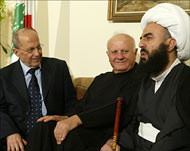Lebanon bishops say poll law unfair
Lebanon’s Maronite Christian bishops have warned that elections starting this month will under-represent their community in favour of Muslim politicians and upset the country’s delicate sectarian balance.

After an emergency meeting, led by Patriarch Nasrullah Sfayr, the Council of Maronite Bishops on Wednesday released a statement warning of what it called the dangerous consequences of implementing the present election law.
The statement added that the 2000 law would not let Christian voters elect their representatives.
“Insisting on holding parliamentary elections under this unfair law will have detrimental consequences that we do not want or wish for,” the council’s statement said.
Delicate situation
“We call on all Christian and Muslim officials to look at this delicate situation and put national interests ahead, holding on to the coexistence that brings together Muslims and Christians on an equal footing,” it said.
Lebanon‘s political system carefully distributes political offices among myriad religious minorities that fought a 15-year war that split the country into Christian and Muslim enclaves.
 |
|
Publicly, the opposition insists |
The Taif Accord that ended the 1975-1990 civil war grants half the seats in parliament to Christians and half to Muslims.
But the bishops said the law organising the polls, to be held in four rounds from 29 May to 19 June, in effect would give Christians less power in the chamber and force Christian candidates into alliances that put them at the mercy of Muslim counterparts.
The bishops said the election law was imposed against the wishes of most Lebanese.
Formidable opposition
Calls for Syria to withdraw from its neighbour mounted after the killing of former prime minister Rafik al-Hariri, which some blamed on Damascus.
The 14 February killing united Christians with other minorities into a formidable opposition that also succeeded in toppling the pro-Syrian government and security chiefs and secured an international investigation into al-Hariri’s assassination.
|
“We call on all Christian and Muslim officials to look at this delicate situation and put national interests ahead” Statement by Lebanon’s Maronite Christian bishops |
But to the dismay of many Lebanese, who had hoped the pullout would mark a fresh start, splits over the law organising general elections are tearing the opposition apart.
Political sources say al-Hariri’s bloc and Druze chief Walid Jumblatt broke with the opposition to strike a secret deal with Hizb Allah and Parliament Speaker Nabih Berri to keep the 2000 electoral law that serves them at the ballot box at the expense of most Christian opposition legislators.
Publicly, the opposition insists it remains united.
Expectations
The law governing the polls in 2000, when Syria maintained a firm grip, carves Lebanon into a mixture of larger and smaller constituencies favouring Damascus‘s allies. It is expected to bring most of the same faces back.
Most Christian lawmakers, who want smaller constituencies so that their voice is not lost among Muslims in larger voting areas, have protested against the law but did not have the majority to overturn it, particularly as the constitutional deadline for timely elections had approached.
Christians are said to have split into four main camps: those loyal to Syria, a bloc of anti-Syrian deputies, supporters of anti-Syrian former General Michel Aoun and followers of the Lebanese Forces.
The return of Aoun from exile and efforts to free the Lebanese Forces leader from jail complicate alliance-making, giving a new voice to Maronites, who have felt disenfranchised since the war, but further dividing them at the ballot box.